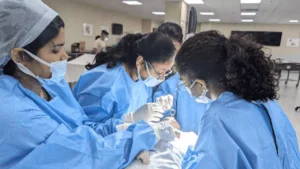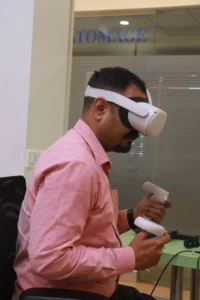Latest Research on Vertigo
Vertigo, which is typified by a spinning or lightheaded feeling, is a symptom that can seriously lower someone’s quality of life. Better patient outcomes have resulted from recent research’s new insights into the causes, diagnosis, and treatment of vertigo. We will examine the most recent discoveries and developments in vertigo treatment in this blog post, giving a thorough rundown.
Understanding Vertigo
There are two basic categories of vertigo: central and peripheral. central vertigo is linked to disorders in the brain, specifically the cerebellum, whereas peripheral vertigo is related to difficulties in the inner ear. To ensure proper diagnosis and treatment, it is essential to comprehend these differences.
Latest Research Findings
Advances in Diagnosis
Modern diagnostic methods have greatly increased the precision of diagnosing vertigo, guaranteeing that patients get the best possible care.
- Video Head Impulse Test (vHIT): This test evaluates the function of the semicircular canals in the inner ear. It is particularly useful in differentiating between peripheral and central vertigo, offering high diagnostic accuracy.
- Magnetic Resonance Imaging (MRI): Advanced MRI techniques are now capable of detecting structural abnormalities in the brain that may cause central vertigo. These imaging advancements allow for more precise localization of lesions and other issues.
Treatment Advancements
The most recent research findings have been used to generate new treatment procedures and enhance already-existing medicines.
Medication

Image Source: Canva
Medications are still the mainstay of vertigo treatment, especially for sudden attacks.
- Betahistine: Recent research has demonstrated how well betahistine works, particularly in individuals with Meniere’s disease, to lessen the frequency and intensity of vertigo episodes. It functions by lowering pressure and enhancing blood flow to the inner ear.
- Vestibular Suppressants: By inhibiting the vestibular system, medications like benzodiazepines, anticholinergics, and antihistamines assist control vertigo symptoms. These drugs are especially helpful in acute episodes.
Physical Therapy

Image Source: Canva
Vestibular rehabilitation therapy (VRT), which focuses on enhancing balance and minimizing dizziness, has become a very successful vertigo treatment.
- Customized VRT Programs: It has been demonstrated that customized VRT programs with gaze stabilization exercises, balance training, and habituation exercises are especially beneficial. These programs work better when they are customized to meet the needs of specific patients.
- Home-Based VRT: With the development of online healthcare and smartphone apps, patients can now follow virtual platforms while performing VRT exercises at home. This strategy improves patient accessibility and convenience, which improves adherence and results.
Surgical Interventions

Surgical procedures may be taken into consideration if medicine and physical therapy are ineffective.
- Labyrinthectomy: In extreme cases of Meniere’s disease, this surgical treatment involves removing the afflicted inner ear labyrinth, which relieves vertigo. Although beneficial, it causes hearing loss in the ear that is being treated.
- Vestibular Nerve Section: Vertigo can be avoided while maintaining hearing by cutting the vestibular nerve. When alternative treatments are ineffective for a serious condition, this operation is usually reserved.
Notable Research Studies
GRACE-3 Approach for Acute Dizziness
The GRACE-3 guidelines for treating acute dizziness and vertigo in emergency rooms were created by a multidisciplinary group. The goal of this evidence-based strategy is to decrease needless imaging and testing while increasing diagnosis accuracy.
Advances in Neuro-Otologic Disease Research
Understanding the molecular and cellular mechanisms behind neuro-otologic illnesses, which include diverse forms of vertigo, has advanced significantly as a result of research. New therapeutic approaches that demonstrate quick advancement (Frontiers) have been developed as a result of this research.
Study on Vestibular Migraine
The relationship between vertigo and vestibular migraine has been studied recently. Research has indicated that common migraine drugs, like triptans and beta-blockers, can be useful in treating vertigo brought on by vestibular migraine. Treatment also heavily relies on lifestyle adjustments including stress reduction and food alterations.
Future Directions

Image Source: Canva
The future of vertigo treatment looks promising with ongoing research exploring innovative approaches.
- Gene Therapy: Genetic advancements have made gene therapy potential for treating vertigo caused by hereditary factors. Patients may benefit from long-term solutions provided by the identification of harmful genes and the development of targeted treatments.
- Artificial Intelligence: In order to diagnose and treat vertigo, patient data is analyzed and predictive models are created using AI and machine learning. By enabling more efficient and individualized care, these technologies can enhance patient outcomes.
Impact of AI on Diagnosis

Image Source: Canva
Using artificial intelligence (AI) to analyze massive patient data sets and forecast outcomes, vertigo diagnosis is being revolutionized. Complex datasets, such as imaging results and patient histories, can be processed by machine learning algorithms to produce rapid and reliable diagnoses. Also, by warning medical professionals of any changes that might call for intervention, this technology aids in the ongoing patient monitoring process.
Personalized Medicine

Image Source: Canva
The use of personalized medicine in the treatment of vertigo is growing, propelled by developments in genetics and artificial intelligence. Healthcare professionals can customize therapy for each patient based on their genetic background, which helps them better understand their disease. This method guarantees that patients experience the least amount of adverse effects while receiving the most effective medicines, therefore increasing treatment outcomes overall.
Conclusion
Significant progress has been made in the diagnosis and treatment of vertigo as a result of recent research. The accuracy of diagnosing vertigo has increased because of improved diagnostic instruments like the video head impulse test and sophisticated MRI procedures. Better results for patients are provided by new treatment methods that combine medicine, physical therapy, and surgical procedures.
Future research on cutting-edge techniques, such as gene therapy and the application of artificial intelligence, holds promise for even more successful treatment of vertigo. In order to guarantee that patients suffering from vertigo receive the most modern and efficient care possible, it is imperative that both healthcare personnel and patients stay informed about these developments.
Updates from healthcare organizations and current articles in medical journals provide further in-depth details on the most recent findings and clinical recommendations. These materials offer insightful information about the continuous attempts to enhance vertigo diagnosis and treatment, which will ultimately improve the condition’s quality of life for those who experience it.
FAQ’s
What is vertigo?
– Vertigo is a sensation of feeling off balance or spinning, which can be caused by various factors such as inner ear problems, infections, head injuries, and certain medications.
What are the common causes of vertigo?
– Common causes of vertigo include benign paroxysmal positional vertigo (BPPV), Meniere’s disease, vestibular neuritis, labyrinthitis, and migraines.
How is vertigo diagnosed?
– Vertigo is typically diagnosed through a combination of medical history, physical exams, and diagnostic tests such as vestibular function tests, imaging studies, and blood tests.
What are the treatment options for vertigo?
– Treatment options for vertigo include vestibular rehabilitation therapy (VRT), canalith repositioning maneuvers, medications such as meclizine (Antivert), and surgery in some cases.
Can vertigo be cured?
– While some cases of vertigo can be cured, others may require ongoing management. The effectiveness of treatment depends on the underlying cause of the vertigo and the individual’s response to therapy.
How can I manage my vertigo symptoms?
– Managing vertigo symptoms involves a combination of lifestyle changes, medications, and physical therapy. This may include avoiding triggers such as sudden movements or changes in position, taking medications as prescribed, and engaging in physical therapy exercises to improve balance and reduce vertigo symptoms.
Can stress cause vertigo?
– Stress can worsen vertigo symptoms, but it is not a direct cause of vertigo. Other factors such as inner ear problems, infections, head injuries, and certain medications can contribute to the development of vertigo.
How can I prevent vertigo?
– Preventing vertigo involves avoiding triggers such as sudden movements or changes in position, managing stress, and maintaining good ear hygiene. It also involves taking medications as prescribed and engaging in physical therapy exercises to improve balance and reduce vertigo symptoms.
Can vertigo be treated with physical therapy?
– Yes, vertigo can be treated with physical therapy. Vestibular rehabilitation therapy (VRT) is a specialized form of physical therapy that can help improve balance and reduce vertigo symptoms.
How can I track my progress with vertigo treatment?
– Tracking progress with vertigo treatment involves keeping a diary or log of symptoms, medications, and physical therapy exercises. This helps healthcare providers monitor the effectiveness of treatment and make adjustments as needed.

